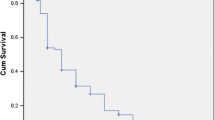Abstract
In children, systemic lupus erythematosus (SLE) is often more severe than in adults. Renal disease is very common in SLE, with clinical symptoms of renal involvement occurring in 30%–70% of patients. In the absence of appropriate treatment the child may die from the disease or progress rapidly to renal failure. However, aggressive treatment regimens, in particular corticosteroids, carry the risk of growth retardation, accelerated atherosclerosis, and severe infectious complications. Lupus nephritis is classified into six groups depending on the severity of the histological lesions. The most-appropriate treatment for optimal efficacy with minimal side-effects depends on the disease severity. Mild lesions (class I or II) require only careful follow-up to identify any disease progression. Patients with class III nephropathy (focal and segmental glomerulonephritis) may have mild clinical symptoms, in which case no specific therapy is indicated, or more-severe symptoms of the nephrotic syndrome, hypertension, and sometimes moderate renal insufficiency. These patients require the same aggressive therapy as those with class IV disease (diffuse proliferative glomerulonephritis). Our current protocol starts with three methylprednisolone pulses followed by 1.5 mg/kg per day oral prednisone and six monthly pulses of cyclophosphamide. After a second renal biopsy the patient may be maintained on azathioprine while the prednisone dosage is slowly tapered. In children with milder disease we use lower doses of oral prednisone (1–1.5 mg/kg per day). Patients with membranous glomerulonephritis (class V) require no specific therapy if they have pure membranous nephropathy, but require aggressive therapy if they have the nephrotic syndrome. In those patients who progress to end-stage renal disease, clinical and serological remission is common and renal transplantation can be performed, as recurrence in the transplant is very rare.
Similar content being viewed by others
Author information
Authors and Affiliations
Additional information
Received: 13 January 1999 / Revised: 12 April 1999 / Accepted: 13 April 1999
Rights and permissions
About this article
Cite this article
Niaudet, P. Treatment of lupus nephritis in children. Pediatr Nephrol 14, 158–166 (2000). https://doi.org/10.1007/s004670050034
Issue Date:
DOI: https://doi.org/10.1007/s004670050034



